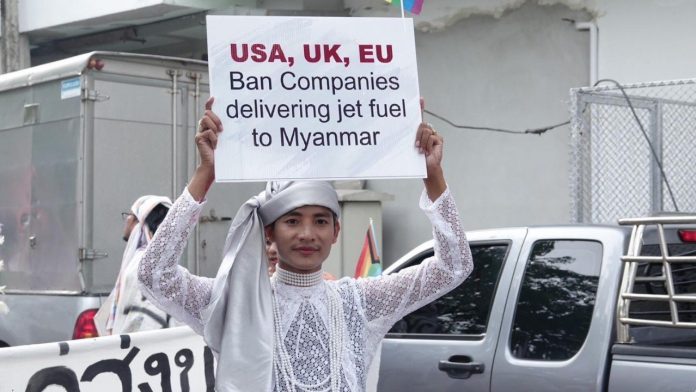The regime in Naypyidaw, which seized power after the 2021 military coup, has faced a total of 70 international sanctions, including 26 from the U.S., 19 from the U.K., 11 from Canada, nine from the E.U., three from New Zealand, and two from Australia, according to data compiled by DVB this week.
“Although these sanctions respond to the regime’s severe human rights abuses and systematic international crimes, the regime may continue to commit atrocities because more targeted sanctions are still needed. It is crucial for Canada and other international governments to coordinate [more effectively],” a Blood Money Campaign spokesperson told DVB.
The Blood Money Campaign is a coalition of Myanmar anti-coup activists calling on the international community for a total aviation fuel ban on the regime.
It released a report called “Close the Sky” on Jan. 9, which documented how the Myanmar Air Force has carried out 4,022 airstrikes on civilians since the military coup on Feb. 1, 2021 up to November 2024, which has caused 3,417 casualties and 2,257 fatalities.
These 70 rounds of sanctions have impacted a total of 392 individuals and 182 organizations. However, critics argue there may be some overlap as the same individuals or organizations could be sanctioned by several different countries.
The U.S. has imposed the most sanctions, accounting for 26, which includes 20 from the Treasury Department targeting 93 individuals and 49 organizations, as well as six rounds of sanctions from the State Department targeting 17 organizations.
The Myanma Oil and Gas Enterprise (MOGE) is one of the most important sanctions by the U.S., since it is the regime’s most lucrative state-owned enterprise.
The U.K. has imposed 19 rounds of sanctions targeting a total of 28 individuals and 39 organizations, while Australia has implemented two rounds against 16 individuals and seven organizations.
Canada has imposed 11 rounds of sanctions, targeting a total of 105 individuals and 48 organizations, including a new round on March 6 which sanctioned three organizations and 13 individuals associated with the regime.
The E.U. has imposed nine rounds of sanctions, targeting 92 individuals and 22 organizations. New Zealand has implemented three travel bans affecting 58 individuals.
Singapore has implemented measures to limit its engagement with Naypyidaw after the 2021 coup, by halting financial services for the regime-run Myanmar Airlines.
It also responded to the U.N. Special Rapporteur on human rights in Myanmar Tom Andrews’ 2025 report “Banking on the Death Trade: How Banks and Governments Enable the Military Junta in Myanmar.”
“Singapore’s policy is to prohibit the transfer of arms to Myanmar, and to not authorise the transfer to Myanmar of dual-use items which have been assessed to have potential military application and where there is a serious risk they may be used to inflict violence against unarmed civilians,” Singapore’s Ministry of Foreign Affairs spokesperson wrote on June 26.
Australian economist and former economic advisor to the National League for Democracy (NLD) government, Sean Turnell told DVB that coordinated sanctions are crucial in severing the regime’s access to international markets. He said that Naypyidaw exploits loopholes.
The U.S. and Australia sanctioned the Myanmar Foreign Trade Bank (MFTB) and Myanmar Investment and Commercial Bank (MICB), but the regime shifted its foreign exchange operations to another state-owned bank.
“Those were the two banks that the junta really relied on to access foreign exchange. So the foreign exchange flowing to the junta stopped as those banks were sanctioned. But that just meant the activity went straight to the Myanmar Economic Bank,” said Turnell. “You get into a game of ‘whack-a-mole’ as different banks emerge.”
During a visit to Belarus on March 7, Min Aung Hlaing claimed that sanctions against Myanmar have been ineffective and only prolong the crisis that has engulfed the nation since the 2021 coup.
“Imposing sanctions and pressure will never succeed. It will only lead to greater conflict. By working together, we will overcome this,” he said during a press conference alongside Belarus’ President Aleksandr Lukashenko in the capital Minsk.
Lukashenko told the regime leader that sanctions can be reframed as an opportunity to forge a stronger relationship between Minsk and Naypyidaw, two nations considered pariahs by most of its neighbours. The regime in Naypyidaw primarily relies on support from Beijing and Moscow to evade international sanctions.



